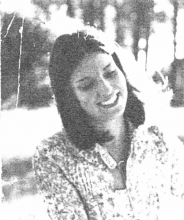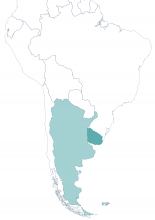Norma Scópice Rijo was born in Montevideo (Uruguay) on 29th April 1951. As a teenager, she liked to play the guitar and, after finishing her A Levels, she studied three years of medicine at the University of the Republic. Norma married Gustavo Couchet with whom she had one daughter. They were both militants of the Movimiento de Liberación Nacional- Tupamaros (National Liberation Movement, MLN-T).
On 11th September 1971, she was intercepted by a police patrol. Although a civil judge decided she would be released, a legal provision approved during these years allowed Norma to be detained again in police quarters. Norma was later detained at the Carlos Nery Nursing School, the building of the former Montevideo Naval School, until she was released later that year on 5th October.
On 26th June 1972, Norma and Gustavo went on a hiking trip to the Cerro de Montevideo mount. On the bus home, they were driving around the corner of Bulevar Artigas and Burgues streets when Norma and Gustavo were stopped by the Fuerzas Conjuntos, the coordinated antisubversive force comprised of the Uruguayan Army, Navy, Air Force, and Police. The patrol recognised them and shot at the couple while they tried to run away. Gustavo was killed almost immediately and Norma was captured. She was taken first to the Montevideo Police Headquarters before being transferred to the Carlos Nery Nursing School once again. In February 1973, a military judge released Norma on probation, provided that she agreed to attend fortnightly meetings with the army's First Infantry Battalion.
Knowing that she was being persecuted, Norma decided to break the rules of her probation in June 1973 to live in Buenos Aires (Argentina). The Uruguayan military intelligence service, the Servicio de Información de Defensa (SID), sent out an order for Norma to be captured.
In Argentina, she worked with the exiled Uruguayan Senator Zelmar Michelini to denounce the crimes of the dictatorship before the international community. In March 1974, Norma travelled with the Senator to deliver testimony before the Russell Tribunal in Rome. Norma recounted the torture to which she was subjected while being detained in Uruguay and denounced her husband's assassination. She anonymised her testimony using fake names.
In Buenos Aires on 23rd November 1976, a group of heavily armed men dressed in civilian attire entered the apartment where Norma was living with her young daughter and her then partner, the Chilean Santiago Pedro Astellarra. Santiago was involved in the Peronist Youth.
Norma tried to escape by jumping through the window of her fourth-floor apartment. She severely injured herself and remained on the floor for two hours with no medical help. Several people witnessed the event, including the porter. A doctor from the building managed to approach Norma and concluded that she had multiple fractures and that her condition was fragile. When the repressors finally dragged Norma away, she remained conscious; calling out the phone number of her parents in Montevideo and pleading that they take care of her daughter. First Army Corps officials and Federal Police officers participated in the operation. It is presumed that Norma was taken to the Military Hospital that functioned in the Campo de Mayo, one of Argentina's largest military bases. Renowned for his lifelong pursuit of defending human rights, the French lawyer, Louis Joinet met Norma when she participated in the Russell Tribunal. Joinet dedicated his autobiography to Norma, called Mes raisons d'état. Mémoires d'un épris de justice (My Reasons of State: Memories of a Lover of Justice), which was published in French in 2013.
To this day, neither Norma nor Santiago's bodies have been found. Norma's forced disappearance is being investigated under the Operation Condor case, which is currently at the stage of criminal pre-trial proceedings.
Her capture and disappearance are yet to be the subject of a specific investigation by the Uruguayan judiciary.


